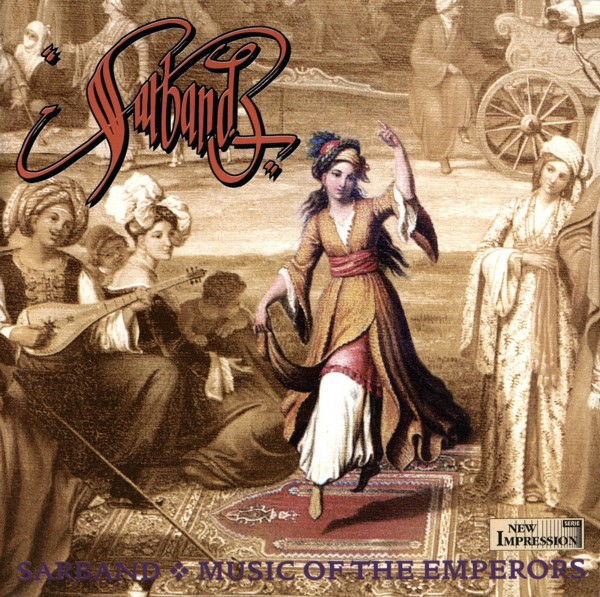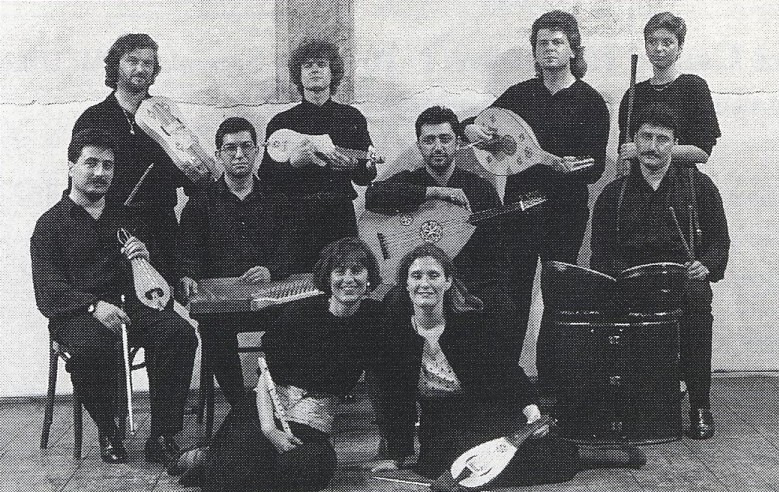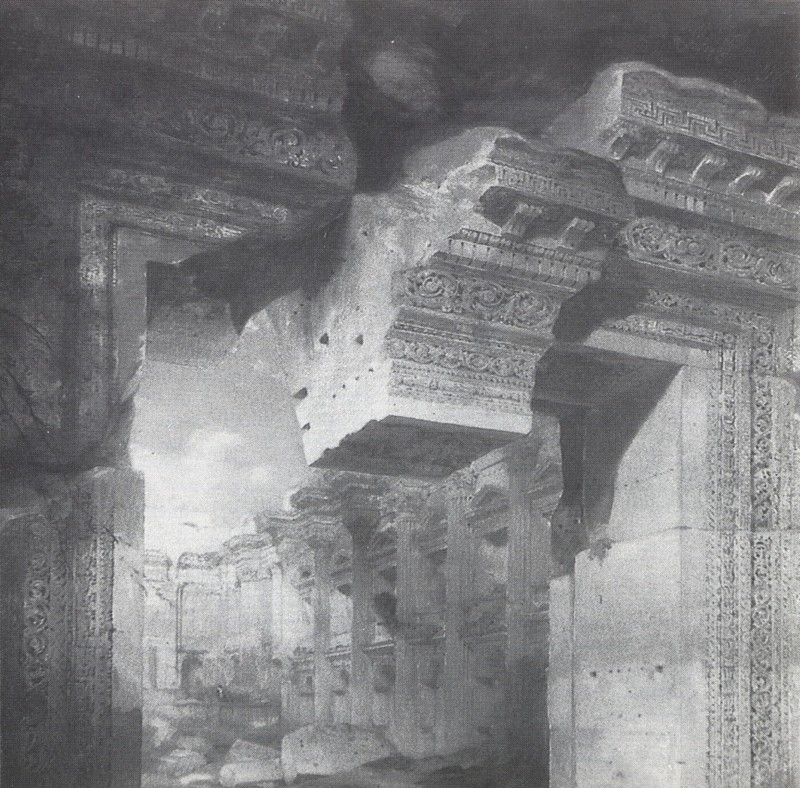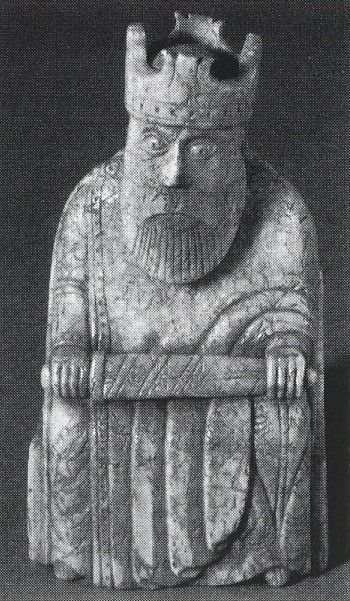Music of the Emperors / Sarband
Friedrich II. :: Palermo — Timur Leng :: Samarkand

medieval.org
Jaro 4156-2
1992
1 . Nel mio parlar [2:27]
Jacopo da BOLOGNA | lauda — Codex Reina (sp. 14. Jh.)
2. Muttettu [4:17]
nach dem mittelalterlichen Motet — Traditionell: Sizilien
Volkstümliche Fassung eines mittelalterlichen sizilianischen Liedes
3. Rast Peşrev [5:39]
Anonym: Sammlung Ali Ufki
Instrumentales Vorspiel (Peşrev) im Maqam (Modus) Rast | Rhythmus/Usul: Devr i Revan :: 14/8.
4. Donna fallante [3:05]
Siciliana — Anonyme | Codex Reina
5. Nikriz Peşrev [5:33]
Anonym: Sammlung Ali Ufki — Instrumentalstück im Maqam Nikriz
6. Dolce lo mio drudo [4:50]
Siciliana — Anonyme | Codex Reina | Text: Friedrich II.
7. Nevâ Çeng-i Harbi - Part I [2:28]
Anonym: Sammlung Ali Ufki | Instrumentalstück im Maqam Nevâ
8. Gazel - Rast Nakıs Beste [8:29]
Abdülkâdir MERAĞI (ca. 1352-1435)
Vokalimprovisation und Lied im Maqam Rast | Rhythmus/Usul: Düyek :: 8/8
9. E vantènde, segnor mio [4:19]
Siciliana — Anonyme | Codex Reina
10. Strençi li labri [4:37]
Siciliana — Anonyme | Codex Reina
11. Lamento di Tristano [8:19]
Estampitta — Anonyme | Ms. Lo., BM 29987
12. Rast Kar-ı Muhteşem [6:47]
Abdülkâdir MERAĞI — Liebeslied
13. Nevâ Çeng-i Harbi - Part II [1:47]
Anonym: Sammlung Ali Ufki | Instrumentalstück im Maqam Nevâ
Nr. 1, 2, 4, 5, 8, 9, 10: Arrangement V. Ivanoff
Nr. 3, 6, 7, 11, 12, 13: Arrangement Sarband/V. Ivanoff
Aufgenommen im Juli 1990 in der romanischen Kirche auf dem Petersberg/Dachau.
Tonmeister: Peter Ruhrberg.
Coverphoto: V. Ivanoff
Coverbild - Ausschnitt aus: Johann Michael Wittmer "An den süßßen Wassern Asiens" (1837)
mit freundl. Genehmigung der Neuen Pinakothek, München
Design by FUEGO.Ateliers/Friedel Muders
Produzenten: V. Ivanoff/Ulli Balss
Ⓟ 1992 JARO. © 1992 JARO

SARBAND
Vladimir Ivanoff
Rose Bihler-Shah — Gesang, mittelalterliche Streichinstrumente
Mustafa Doğan Dikmen — Gesang, Ney
Cornelia Melián — Gesang, Organetto, Blockflöte
Fabio Accurso — Cetra, Traverse, Perkussion, Schalmeien
Paolo Giuseppe Cecere — Viella, Drehleier, Schalmeien,
Zugtrumpeet, Gesang
Alison Gangler — Schalmeien
Fatih Ovalı — Tanbur, Perkussion
İhsan Özer — Kanun, Perkussion
Ahmed Kadri Rizeli — Kemençe, Perkussion
Mehmet Yeşilçay — Ud, Perkussion
Vladimir Ivanoff — Laute, Organetto, Perkussion
The SARBAND ensemble was founded in March 1986 with the aim of showing,
through concerts and research, the relationship between early European music and the musical cultures of Islam.
SARBAND is a term used in a 14th, century Syrian tractatus
to refer to the coupling of two parts within a musical suite.
SARBAND is a unique kind of musical ensemble,
which draws its inspiration from various musical cultures,
integrating them into its programs.
Their multi-facetted repetoire comprises oriental
and occidental music from the Middle Ages,
as well as Baroque and contemporary music.
SARBAND's musical director, Vladimir Ivanoff,
studied lute and historical performance practice
at the Schola Cantorum Basiliensis,
and obtained his doctorate in musicology at Munich.
'When designing programmes and selecting musicians,
who come from Turkey, Italy and Germany,
special attention is given to the muscial dialogue,
which goes beyond the cultural taboos between
Christianity and Islam existing today.

This recording is the product of dreams. Different people had dreams in vastly different places and ages.
Palermo:
Frederick II. (1194-1250)
Frederick
II., a Hohenstaufen, kaiser, poet and scientist, dreamed of the „magic
of a happy Asia", of an all-embracing global power and global culture.
In his castles in southern Italy and on Sicily he maintained court music
with Christian and Islamic minstrels, singers and dancers. At
Frederick's
time oriental musicians were extraordinarily popular: an Anglo-Norman
poem recounts the story of a knight who colored his face black and posed
as an Ethiopian singer to
achieve greater success. Frederick also
wrote passionate poems: the Italian poet, Francesco Petrarca, notes in
the foreword to his Epistolae ad familiares that this new type of poetry from Sicily had spread over the whole of Italy. The poetic motifs of the Siciliane
resemble the Saracene love songs of Sicily, which found expression in
the folk and dance songs still sung on Sicily with Near Eastern
melodies. Traces of the music played at Frederick's court are contained
in Sicilian traditional music (Mutettu/Dolce lo mio drudo) and in the Codex Reina, an Italian manuscript dating from the late 14th century.
Samarkand:
Timur Leng/Tamerlane (1370-405)
Mongol
khan Timur also dreamed of a global empire. The Mongols regarded their
ruler as the son of God; which is why the khans laid claim to world
rule. Timur shared this conviction. His motto was: „Just as there is
only one God in Heaven, there can be only one ruler on Earth". After the
fall of Baghdad in 1258 the cultural center of the Orient had shifted
further east; Persian took the place of Arabic as the cultural language.
Timur, now the key political figure in the Islamic countries, leveled
the Persian dynasties and their courts to the ground. Abdülkâdir Meraği,
the best-known musician of his time, was „taken" to Samarkand, the new
center of the Orient, by Timur and spent the longest period of his life
there as a court musician.
A contemporary traveller described the
music at the court of Samarkand. Timur had assembled musicians from
many different countries in his gigantic court ensemble. Each course of a
banquet was accompanied by music played by an ensemble from the Far or
Near East, Iran or southern Europe. At the end of the feast the
ensembles joined forces, probably under the direction of Abdülkâdir
Meraği, as an orchestra of different cultures that was unique in
diversity and size. Abdülkâdir directed also the court music of Timur' s
son, Shahruh, which Hafez-i Abru described as follows: "Singers with beautiful voices and instrumentalists with sweet sounds played motifs in Persian style within Arabic melodies, after the Turkish
tradition, with Mogul (Indian) voices and following the Chinese laws of
singing and rhythms from the Altai mountains."
Though some of
Abdülkâdir Meraği' songs have been handed down orally, the
interpretation of the compositions from Timur's court in this recording
is primarily based on one source: the Polish musician, Albert
Bobovski/Ali Ufki (1610-1675), who lived and received his training in
Constantinople. He put together a manuscript collection (today in the
British Museum in London) with his own compositions and early music from
the repertoire of Ottoman court music.
Music of the Emperors
Frederick
and Timur: the two rulers have conspicuous features in common. They
stopped at nothing to satisfy their absolute will for power, not even
acts of human atrocity; both demonstrated their power through
bloodbaths, on the one hand, and by maintaining a very costly and
cleverly organized court, on the other hand. A significant part of court
culture was the music, which by virtue of complex structures, unusual
ensembles and complex compositional techniques was a representative
mirror, a status symbol for court and state. For the Orient and Occident
the extraordinary degree of cruelty and the unusually high level of
musical culture were the most suitable yardsticks of power. Is the
situation today any different?
SONG LYRICS
The
lyrics of the oriental as well as of the Italian songs are complicated
and highly synthetic linguistic creations. The ambiguity and symbolism
of this poetry makes a precise translation impossible. Therefore, only a
few notes and explanations are attached to the original texts.




